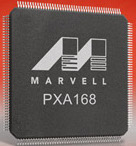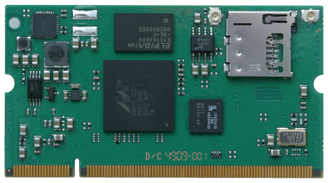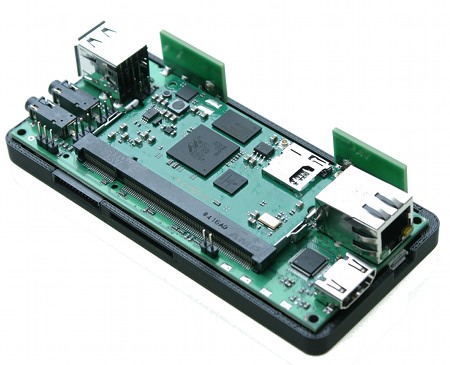SODIMM-sized SBC has onboard flash, microSD slot
Aug 13, 2010 — by LinuxDevices Staff — from the LinuxDevices Archive — 114 viewsKeith and Koep GmbH announced a SODIMM-sized, Linux-compatible single board computer (SBC) and a compact baseboard to go with it. The Trizeps VI offers Marvell Armada 100-series processors clocked at 800MHz or 1.1GHz, up to 256MB of RAM and 512MB of flash storage, and an onboard microSD socket, while the baseboard adds an Ethernet port and HDMI, among other functionality.
According to Keith and Koep, the Trizeps VI offers a choice of Marvell Armada 100-series processors. These include the 800MHz Armada 166, also known as the PXA166, and the Armada 168 (PXA168), clocked here at 1.1GHz.
 The PXA168, pictured at right, was first announced in January 2009, with an ARMv5-based Sheeva core. It implements both Feroceon and XScale micro-architectures and is compatible with Intel's Wireless MMX2 multimedia extensions (inherited when Marvell acquired Intel's XScale-based SoCs in 2006).
The PXA168, pictured at right, was first announced in January 2009, with an ARMv5-based Sheeva core. It implements both Feroceon and XScale micro-architectures and is compatible with Intel's Wireless MMX2 multimedia extensions (inherited when Marvell acquired Intel's XScale-based SoCs in 2006).
The SoC, which includes support for Linux, as well as Windows CE 6.0, offers a 32KB first-level cache, 128KB second-level cache, and 720p video, among other features. (For further information, see a block diagram, here, and our earlier coverage, here.)
According to Marvell, the PXA168 may be clocked up to 1.2GHz, but, as noted above, Keith and Koep cites a slightly lower 1.1GHz speed for the Trizeps VI. The little SBC offers 128MB or 256MB of soldered-on DDR2 memory, plus 256MB or 512MB of onboard flash storage, according to the company.

The Trizeps VI
The Trizeps VI, said to measure 2.66 x 1.44 inches (67.6 x 36.7mm), also makes room for an onboard microSD slot, visible in the photo above. Otherwise, all the board's interfaces travel through its 200-pin SODIMM connector to a separately available baseboard (see later for details).
Keith and Koep says the Trizeps VI can support LCD displays with resolutions up to 1920 x 1200 pixels. Other interfaces are said to include:
- two USB 2.0 ports (one host, one host/slave)
- 10/100 Ethernet
- three serial ports
- two SD/MMC/SDIO interfaces
- a camera interface
- audio
- SPI, I2C, and PWM
The company's product brief for the Trizeps VI also alludes to Bluetooth 2.0 support, a CompactFlash interface, a four-in-1 card reader (xD, MMC, SD, and Memory Stick), and a four-wire resistive touchscreen interface. We expect this touted functionality would need to be added via a baseboard, of which several existing models are listed on the company's website.

The tiny IT6 baseboard
(Click to enlarge)
Be that as it may, Keith and Koep also announced the IT6 (above), a baseboard that, while its dimensions were not provided, appears to be not a great deal bigger than the Trizeps VI itself. Once fitted to this board, the module becomes a tiny thin client or small automation control unit, the company says.
According to Keith and Koep, the IT6 includes not only a connector for the Trizeps VI, but also an Ethernet port, two USB ports (either two hosts, or one host and one client), and even an HDMI connector. The baseboard also offers an SD/SDIO/MMC card connector, Wi-Fi and Bluetooth antennas, audio connectors (mic in and line out), plus a 26-pin extension connector carrying serial, I2C, analog, and digital I/O, the company says.
Further information
According to Keith and Koep, the Trizeps VI and IT6 are available now, though pricing was not provided. The module is available with a Windows CE 6.0 board support package (BSP) and comes with a Windows CE OS image, while Linux support is provided via a separate firm, Thermotemp GmbH, the company says.
Further information on the Trizeps VI and IT6 may be found on the Keith and Koep website, here and here, respectively. Information on Thermotemp's Linux for the module may be found here.
This article was originally published on LinuxDevices.com and has been donated to the open source community by QuinStreet Inc. Please visit LinuxToday.com for up-to-date news and articles about Linux and open source.